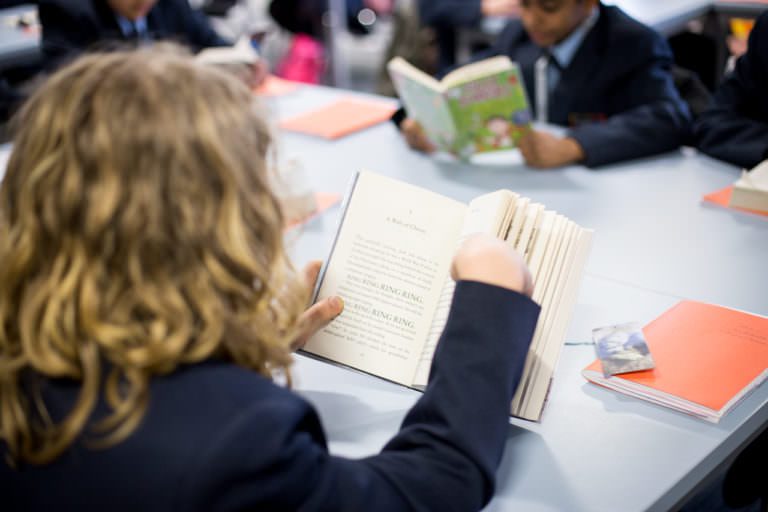It is our hope that students will foster their love for English and creative expression throughout their time at Bluecoat Wollaton. Through the broad and balanced English curriculum, students will become competent readers and accomplished writers who strive for technical accuracy in all work. Through the reading of a full range of ambitious texts, we have faith that students will become inquisitive, thoughtful and logical in their assertions. The curriculum will prepare students for the world through giving cultural knowledge, combined with skills for work, citizenship and life, whilst enabling students with opportunities to see and know more about the world around them. Through this students will start to explore the views of others and also find confidence in their own views and voice. Students will be able to apply this knowledge to reason the impact and effect of writers’ choices on contemporary and historical audiences.
Our English Curriculum is designed with chronology in mind, as the sequential development enables students to make memorable frameworks therefore increasing cultural capital by giving them a prior preconception of significant eras. This gives students an ability and confidence to decode new and unfamiliar texts and when studying a text allows students an understanding of the literary tradition that went before, leading students to make thoughtful predictions about writers’ intentions and impacts on audiences.
Building on the national curriculum, our curriculum is organised around 4 central strands: fictional prose, non-fiction, Shakespeare and poetry. Through these strands we enable students to access the key threshold knowledge concepts: context, theme, character, genre/form, structure/language, academic writing.
Each strand is built on in a clear sequence; through our Programme of Study it is clearly shown and communicated with students how each unit builds on prior knowledge and also teaches key concepts that will be built upon further in their learning journey. Each unit is centred around a challenging question, combined with 8-10 vast, limitless and unbiased ‘Big Questions’ to inspire higher order critical thinking and to give students an opportunity to reflect and build on their own opinions. There are specific key terminology/ concepts that are learned within each unit relating to the key strands that are built upon, which working in coordination with knowledge organisers, make it clear what students should have learned by the end of the unit in readiness for the next.
Quality texts are chosen thoughtfully to give students an insight into a variety of different literary and cultural traditions, enabling discussion regarding ‘the big issues’ and to teach understanding of the key concepts. This is supported through fostering reading for pleasure in library lessons and fostering a love of reading through literary competitions. This love of reading and writing is further developed through opportunities outside of lessons to enrich their skills through various clubs and extracurricular visits to theatres and establishments that will enhance their understanding of studied texts or cultures.
As part of building cultural capital, students are explicitly taught grammar as part of each unit to enable them with the ability to think and communicate in an academic way, allowing students to think meta-cognitively about writing and make informed choices which represent fully what it is that they want to say. Combined with this vocabulary is also taught in each unit and early intervention is put into place to allow students to build their own vocabulary and ‘close the word gap’. Building on this, students are also give opportunity to develop their own personal presentation skills, focusing on spoken language and preparing them for life beyond the school curriculum.
GCSE English Language (AQA)
In GCSE English Language, students work towards 100% terminal examinations. This is comprised of two papers:
Paper 1: Explorations in Creative Reading and Writing (50%)
Paper 2: Writers’ Viewpoints and Perspectives (50%)
Students use all of the knowledge and skills from their English Language course and apply this to the exam papers. Students work on the exam rubric of Paper 1 before their penultimate assessment, then on the exam rubric of Paper 2 before their final assessment in the spring term. After a diagnostic analysis of their mock results, teachers then focus the rest of the Paper 1 and 2 revision on weaknesses based on this.
GCSE English Literature (AQA)
In GCSE English Literature, students are also assessed with 100% terminal exams. The papers students sit are:
Paper 1: Shakespeare and Post-1914 Literature (50%)
Paper 2: 19th-century Novel and Poetry since 1789 (50%)
There are no longer tiers to the exams, and all students sit the same exam papers, which can be awarded a Grade 1-9. In order to achieve highly on the course, Students should read widely outside of lessons and ask questions about texts. In Year 11, students will begin by finishing the 15 Time and Place poems. Students will then revise all of the literature texts so far before their penultimate assessment. There will then be a focus on teaching academic writing, including structuring your ideas to show a line of argument, followed by further revision before the final assessment.

Careers Links
English is an excellent source of transferable skills that can be applied to a vast range of different career paths. Click here for examples of some of the employability skills English can provide.
- MYPATH: How will English help me?
- Where can English take you?
- Careers using English
- How to become a features editor: Lisa's story
- How to become a journalist: Sirin's story
- What is it like to be... a poet, writer and spoken word artist?
- How to become a screenwriter: Roanne Bardsley's story
- How to become a radio presenter: Swarzy's story
- How to become a filmmaker and vlogger: Isaac's story
- MYPATH: JOB OF THE WEEK - EPISODE #12 - LIBRARIAN
- MYPATH: JOB OF THE WEEK - EPISODE #10 - JOURNALIST


